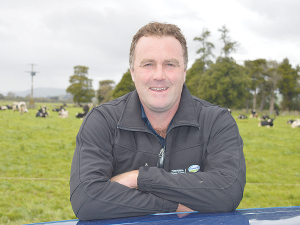Global Dairy Trade Recovery Puts $9.50 Milk Price Within Reach
A solid recovery of global dairy prices this year makes a $9.50/kgMS milk price almost a shoo-in for this season.
 Fonterra Co-operative Council chair John Stevenson says there is a lot of confidence among Fonterra farmers right now.
Fonterra Co-operative Council chair John Stevenson says there is a lot of confidence among Fonterra farmers right now.
The 2025-26 season is set to start on a high and a $10/kgMS opening forecast milk price isn't being ruled out.
Fonterra will unveil its opening forecast milk price for the new season on Thursday (May 29th) and economists believe that some of the factors constraining global dairy supply are likely to be persistent - like environmental constraints in Europe and significant profitability challenges for China's dairy farmers.
ANZ is forecasting a $10/kgsNS opening forecast milk price while ASB is settling for $9.75/kgMS. The new season kicks off June 1.
Fonterra Co-operative Council chair John Stevenson says feedback to Council shows that there is a lot of confidence among Fonterra farmers right now.
Stevenson says a high advance rate on a good forecast milk price this season has allowed many to pay down debt and catch up on defered maintenance and plant replacement.
"Farmers have told us that they are keen to see a strong opening forecast for the new season as they look to lock in some feed costs and plan future debt repayment and expenditure," he told Dairy News.
However, he says farmers will be aware that a lot can change in global markets during a season, so there may be some caution until there is more certainty around where any final milk price may land.
Stevenson says the Fonterra board will ultimately make the decision on the opening milk price.
ANZ chief economist Sharon Zollner says looking towards next season, the starting point for global dairy prices is much higher than looked likely.
Zollner says dairy prices have outperformed expectations in recent months as tight global supply has seen buyers compete hard for product.
In two of the three Global Dairy Trade (GDT) auctions since Donald Trump's "Liberation Day" dairy prices have shrugged off the global turmoil and lifted further. Last week's GDT saw prices dip slightly.
Zollner points out that some of the factors constraining global dairy supply are likely to be persistent, keeping prices elevated.
However, higher prices will encourage more supply from those who can, and there are dark clouds hanging over the global growth outlook.
"Uncertainty is high, but it therefore seems prudent to assume that more modest demand will see prices retreat from current levels as the new season goes on.
"But it is certainly good to be going into what could be more turbulent times from a position of strength."
ASB's senior economist Chris Tennent-Brown says it's encouraging that the dairy sector is holding up well so far, despite the global uncertainties.
"In the grand scheme of things, the price looks like it will be fairly like the season just ending, and there is the temptation to round up to an even $10.
"The season is certainly set to start on a high."
However, Tennent-Brown also cautions that there is a huge degree of unpredictability around the trading environment, courtesy of the trade war.
The US and China are still some way from reaching any tariff agreement - so the impact on China's economy from reduced exports and any offsetting government stimulus are not known.
"Yet those factors will have a lot of influence on dairy demand from our biggest export market - China," he says.
"Our US-destined dairy exports include a range of specialised products which may insulate them to some degree. But there is always the possibility of additional tariffs if sector-specific tariffs ever get added in.
"We are sure, though, that Fonterra will be seeking out opportunities to supplant other countries' exports, given that US exports into China will be drying up faster than milk in a powder plant and Canadians are probably going off spraying US whipped cream on their bacon and maple syrup pancakes."
Global trade has been thrown into another bout of uncertainty following the overnight ruling by US Supreme Court, striking down President Donald Trump's decision to impose additional tariffs on trading partners.
Controls on the movement of fruit and vegetables in the Auckland suburb of Mt Roskill have been lifted.
Fonterra farmer shareholders and unit holders are in line for another payment in April.
Farmers are being encouraged to take a closer look at the refrigerants running inside their on-farm systems, as international and domestic pressure continues to build on high global warming potential (GWP) 400-series refrigerants.
As expected, Fonterra has lifted its 2025-26 forecast farmgate milk price mid-point to $9.50/kgMS.
Bovonic says a return on investment study has found its automated mastitis detection technology, QuadSense, is delivering financial, labour, and animal-health benefits on New Zealand dairy farms worth an estimated $29,547 per season.
OPINION: Staying with politics, with less than nine months to go before the general elections, there’s confusion in the Labour…
OPINION: Winston Peters' tirade against the free trade deal stitched with India may not be all political posturing by the…